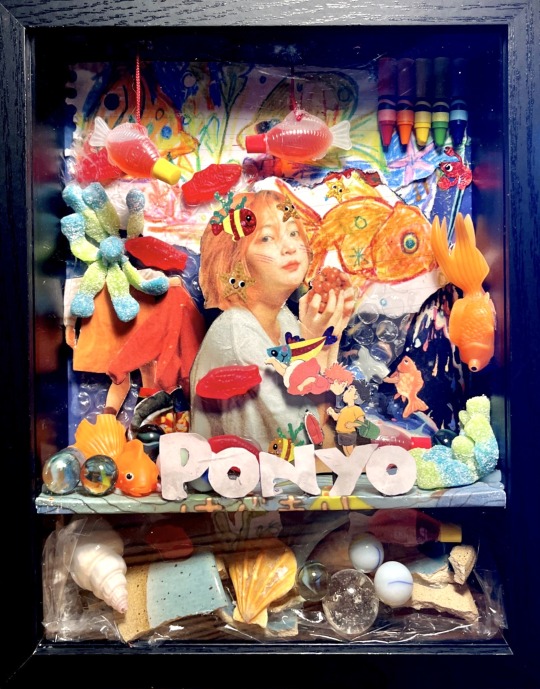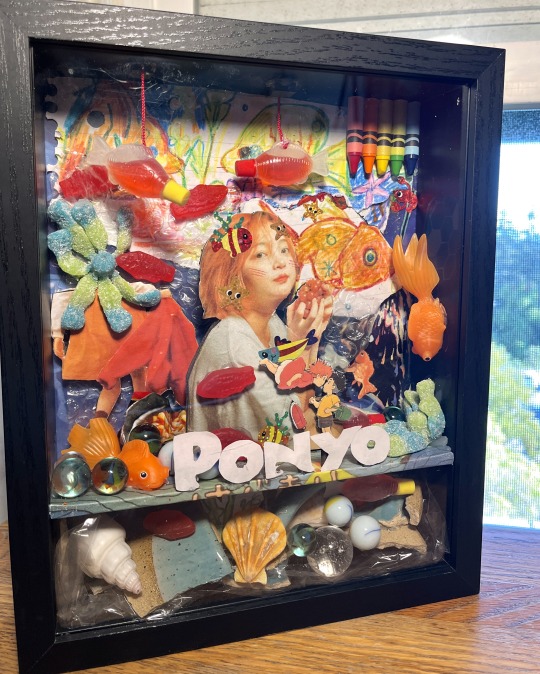#I AM BACK AFTER LIVING IN THE UNIVERSITY/STAGE MANAGER VORTEX FOR 3 MONTHS!!!
Text


PONYO PONYO PONYO FISHY IN THE SEA
#I AM BACK AFTER LIVING IN THE UNIVERSITY/STAGE MANAGER VORTEX FOR 3 MONTHS!!!#this was a homework assignment lol but i like it a lot so here u go#ponyo#shadow box art#collage#olliearts
20 notes
·
View notes
Text
True/False 2020: Day 2

Number of Films: 3
Film of the Day: Some Kind of Heaven
Lovemobil: The idea of giving a sex worker their own rental trailer, so they can cut out the middleman and reap their own profits, might at first sound like an improvement for them, a way to take control over their own labor. But then, you have to factor in the daily rent they have to pay, and the fact these particular RVs are all situated down the same bleak German highway — set apart in roughly 1/2 mile increments — and suddenly the deal doesn’t seem quite so wonderful. Then, you have to consider how most of them got there in the first place: One such woman featured in Elke Margarete Lehrenkrauss‘s plaintive doc fell for the promise of a “friend” that she could find work as a cleaner in Germany, only to leave her native Bulgaria, arrive in Berlin, and immediately get abducted into a sex slave ring until she managed to escape. Another young woman, from Nigeria, is there in order to earn money for her family back home, still secretly hoping she can just meet a decent bloke and settle down somewhere. Not likely, given this crew of German factory workers, many of whom are “smelly” according to the women, and tend towards the domineering and physically abusive (one unfortunate soul we never meet gets murdered in the course of the film, stabbed multiple times, a horror the women shudder to contemplate). Despite the general misery of their jobs, and the awful experiences they have time and again with the hideous “customers” they encounter, it’s also striking how debilitating it is when the women aren’t actively working. Stuck in their mini RVs, with next to nothing to do, save brief spells of camaraderie with fellow workers, the soul-deadening boredom and idleness seems to demoralize the women even further. In one scene, near the end, the Bulgarian woman travels to Berlin to meet with her best friend, with whom she confesses her actual line of work. Horrified, her friend sobs and offers her the chance to move in with her in the city and get a less horrific and demeaning gig. The offer is clearly meant in heartfelt good faith, but even though her friend assures her she’ll take her up on it, we are to understand how deeply unlikely that is. As deep into the vortex of misery and shame as she is, it will take more than a sincerely kind offer from her best friend to extricate her from that awful trailer.
The Viewing Booth: More a kind of filmed thought experiment than a movie unto itself, Ra'anan Alexandrowicz‘s nevertheless provocative work offers interesting insights on the way in which we perceive materials that might challenge a deeply held belief. Alexandrowicz, an Israeli sympathizer to the Palestinian cause, brings in a series of students from the American university in which he works to watch selected videos having to do with the conflict, a selection of material divided in half between pro-Palestinian and pro-Israeli sides. His idea is to record the reactions of the viewers as they watch the videos, hoping to glean how an opinion other than his own might be derived at from the same source material. He meets with seven volunteers, but it is the outspoken Maia — whose parents are both Israeli — whom he finds most illuminating. Extremely skeptical of the pro-Palestinian videos, finding suspicious the most heart-rendering sequences, we watch her as she is momentarily affected (especially when they involve children), then as she scrambles to re-assess what she’s seeing and talk herself out of her sympathy. So intrigued is the director (correctly deducing that she represents the exact audience with which he wants to challenge and affect with his own work), he brings her back to the lab six months later, in order to observe not just those same videos, but her initial reaction to those videos, as they play out in front of her. To her credit, Maia isn’t entirely intractable, and seems more than willing to challenge her perceptions in order to gain a better insight into the process of her own biases at work. The conclusion they draw together, the ways in which our pre-existing emotional predilections drive us to reject and reinterpret that which doesn’t reinforce our beliefs seems obvious, but the way it plays out, in real time, in front of us, feels nevertheless intriguingly revelatory.
Some Kind of Heaven: I had certain trepidations concerning Lance Oppenheim’s doc about The Villages, the largest retirement community in the U.S. (naturally, it’s in Florida). Mostly, I wasn’t much interested in seeing an arch “aren’t old people cute” comedy. Fortunately, Oppenheim isn’t after anything quite so trite. While it’s certainly a crowd-pleaser, and often wry, his film also offers a deeper meditation on human psychology, how we remain who we are even in the face of our imminent demise. The framework remains engagingly simple, focusing on the sense of the community itself, via three specific protagonists: There’s Barbara, a newly widowed woman having to reintegrate back into singlehood; Dennis, a shifty handyman, who sneaks into the enclave living out of his van, in hopes of meeting a rich elderly woman with whom he can leech; and Anne and Reggie, married for 47 years, as they drift further apart due to Reggie’s increasing peculiar behavior, and heavy drug use. In each case, Oppenheim follows along their separate narratives, closely hewing to recognizable arcs, but allowing his subjects the dignity of veering from what we might expect. Very little is conclusive as far as their stories go — though in each case, a certain resolution has been established — but the effect is to suggest a greater theme: As the director put it in his on-stage introduction of the film, we do get older, but not necessarily any wiser. As his subjects sort through their unexpected circumstances, we at once recognize the familiar process of their upheaval, and realize even in the face of impending mortality, we still have no choice but to adapt to what’s thrown at us.
Tomorrow: Another raucous day beginning with the Sundance-fave Time; then Collectiv; Pier Kids; and Faith.
Photo from Some Kind of Heaven
Leaving the warmer confines of Philadelphia for the wind-swept climbs of the midwest this March weekend, I am down in Columbia, MO, home of the 17-year-old True/False Film Festival, a collection of (mostly) documentary films, entertaining buskers, and outrageously dressed Queue queens.
#sweet smell of success#ssos#piers marchant#films#movies#true/false 2020#columbia mo#some kind of heaven#lance oppenheim#lovemobil#Elke Margarete Lehrenkrauss#the viewing booth#israel#palestine#Ra'anan Alexandrowicz#arkansas democrat gazette
1 note
·
View note